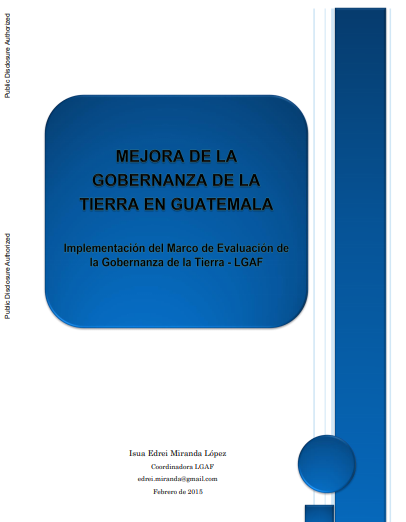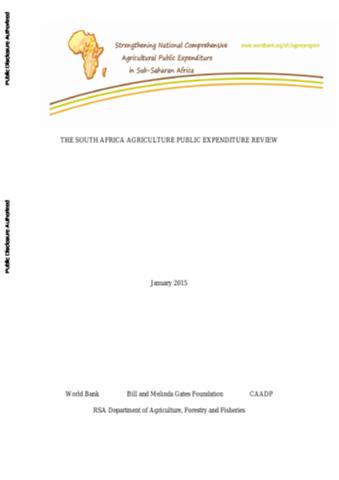The World Bank is a vital source of financial and technical assistance to developing countries around the world. We are not a bank in the ordinary sense but a unique partnership to reduce poverty and support development. The World Bank Group has two ambitious goals: End extreme poverty within a generation and boost shared prosperity.
- To end extreme poverty, the Bank's goal is to decrease the percentage of people living on less than $1.25 a day to no more than 3% by 2030.
- To promote shared prosperity, the goal is to promote income growth of the bottom 40% of the population in each country.
The World Bank Group comprises five institutions managed by their member countries.
The World Bank Group and Land: Working to protect the rights of existing land users and to help secure benefits for smallholder farmers
The World Bank (IBRD and IDA) interacts primarily with governments to increase agricultural productivity, strengthen land tenure policies and improve land governance. More than 90% of the World Bank’s agriculture portfolio focuses on the productivity and access to markets by small holder farmers. Ten percent of our projects focus on the governance of land tenure.
Similarly, investments by the International Finance Corporation (IFC), the World Bank Group’s private sector arm, including those in larger scale enterprises, overwhelmingly support smallholder farmers through improved access to finance, inputs and markets, and as direct suppliers. IFC invests in environmentally and socially sustainable private enterprises in all parts of the value chain (inputs such as irrigation and fertilizers, primary production, processing, transport and storage, traders, and risk management facilities including weather/crop insurance, warehouse financing, etc
For more information, visit the World Bank Group and land and food security (https://www.worldbank.org/en/topic/agriculture/brief/land-and-food-security1
Resources
Displaying 1046 - 1050 of 4907Mejora de la gobernanza de la tierra en Guatemala : Implementaciön del marco de evaluaciön de la gobernanza de la tierra - LGAF (Spanish)
The Land Governance Assessment Framework (LGAF) is a diagnostic tool to assess the status of land governance at country level using a participatory process that draws systematically on existing evidence and local expertise rather than on outsiders.
The South Africa Agriculture Public Expenditure Review
This South African Agricultural Public Expenditure Review (AgPer) is one of a series of similar studies undertaken in several countries in Sub-Saharan Africa under the Comprehensive Africa Agriculture Development Program (CAADP) of the African Union’s (AU) New Partnership for Africa’s Development (NEPAD) which encourages governments and development partners (DPs) to target public expenditure on the agriculture sector as the most effective way of stimulating growth.
Social Safety Nets and Gender : Learning from Impact Evaluations and World Bank Projects
Poverty reduction is the overarching
objective of the World Bank Group and is reflected in the
institution s commitment to the Millennium Development Goals
(MDGs). More recently, the twin goals of the institution,
eradicating extreme poverty by 2030 and boosting shared
prosperity, expressed a renewed commitment toward the Bank
Group s vision of a world free of poverty. This message is
intimately related to another main goal of the institution:
The Unfulfilled Promise of Oil and Growth : Poverty, Inclusion and Welfare in Iraq 2007-2012
Iraq appears to have firmly entered the
ranks of upper middle-income countries in 2012, having
experienced strong economic growth following the
establishment of a civilian elected government in 2005-06.
In 2012 the years of growth culminated in a per capita GDP
of 2472 constant 2005 US$. This three-volume poverty and
inclusion assessment provides the first in-depth analysis of
Iraq's economic and social development during the
City Planning Labs : A Concept for Strenghtening City Planning Capacity in Indonesia
The cities that emerge from Indonesia s
rapid urbanization will be key determinants of the country s
overall economic development and competitiveness, as well as
their inclusiveness and environmental sustainability.
However, without strategically planned investments, policy
interventions, and institutional capacity, mismanaged
urbanization could become an obstacle to sustainable growth.
The city planning labs core module will be initially








